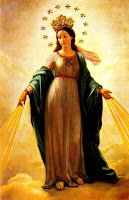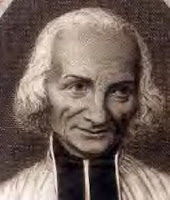
We have the strange understanding of saints as people who are totally remote from our own experiences: medieval, other worldly, strange – almost fairy tale like. To many, saints are those whose feet are up there in the clouds, residing in their own ivory towers, so far from our daily experiences – they must be people who belonged to some other time, definitely not ours.
That is why at the end of the Great Jubilee 2000, when John Paul II wrote that “all pastoral initiatives must be set in relation to holiness” ( John Paul II, Novo Millenio Ineunte, 30.), some people thought that it was simply impractical to still speak of holiness in pastoral plans. It simply did not seem consistent with the language of the times. Can holiness be the foundation of pastoral planning? Shouldn’t we speak in more practical terms?
John Paul II taught that holiness is very much the language of the 2nd Vatican Council: “It is necessary therefore to rediscover the full practical significance of Chapter 5 of the Dogmatic Constitution on the Church Lumen Gentium, dedicated to the "universal call to holiness". The Council Fathers laid such stress on this point, not just to embellish ecclesiology with a kind of spiritual veneer, but to make the call to holiness an intrinsic and essential aspect of their teaching on the Church. The rediscovery of the Church as "mystery", or as a people "gathered together by the unity of the Father, the Son and the Holy Spirit",15 was bound to bring with it a rediscovery of the Church's "holiness", understood in the basic sense of belonging to him who is in essence the Holy One, the "thrice Holy" (cf. Is 6:3). To profess the Church as holy means to point to her as the Bride of Christ, for whom he gave himself precisely in order to make her holy (cf. Eph 5:25-26). This as it were objective gift of holiness is offered to all the baptized.” (Ibid.)
John Paul made it so simple. To him, Holiness is simply “belonging to Him who is…the Holy One.” It means incorporation into Christ and the indwelling of His Holy Spirit. It means abiding in Christ as He abides in us because He is the Vine and we are the branches…we belong to Him. Thus, at baptism, the question asked of the catechumen: “Do you want to be baptized?” actually means “Do you want to be holy?” It is because baptism incorporates us into Christ, makes us belong to Christ. Belonging to Christ is the very essence of holiness. Christian life as a vocation to holiness expresses the radicality of the words of Jesus: “Be perfect as your heavenly Father is perfect.” (Matt. 5:48.)
John Paul canonized and beatified many saints, “among them many lay people who attained holiness in the most ordinary circumstances of life.” (NMI, 31.) He did so in order to teach that the “ideal of perfection must not be misunderstood as if it involved some kind of extraordinary existence, possible only for a few ‘uncommon heroes’ of holiness. The ways of holiness are many, according to the vocation of each individual.” (Ibid.) “The time has come to re-propose wholeheartedly to everyone this high standard of ordinary Christian living.” (Ibid.) Yes, the standards of ordinary Christin living are high. Therefore, “it would be a contradiction to settle for a life of mediocrity, marked by a minimalist ethic and a shallow religiosity.” (Ibid.) John Paul has always been critical of mediocity. He always reminded us to “cast into the deep.” (Duc in altum.) We should not be satisfied with a minimalist ethic and a shallow religiosity.
John Paul, who canonized and beatified many saints is himself now a “Beato.” He himself understood that if all pastoral initiatives must be set in relation to holiness, the pastor himself must lead by example of holiness. And holy indeed was John Paul – intense in his prayer, exemplar in his ministry, heroic in his suffering. His holiness was rooted in his communion with the Lord and His Blessed Mother. Totus Tuus – his famous motto, expressed his unconditional surrender and consecration to the Blessed Virgin. It was his constant fiat, closely in imitation of the Fiat of Mary that accounted for a truly fruitful ministry. And the fruits are undeniable: the collapse of the Berlin Wall, the death of Communism, the struggle against Moral relativism, the defense of all human life, the Catechism of the Catholic Church, the Code of Canon Law, the publication of the new liturgical books, the World Youth Days, and the World Meetings of Families. Truly, when one abides in Christ the Vine and Christ abides in him, he bears fruits, fruits that endure.
Blessed John Paul brings the world of saints so close to us. His sanctity isn’t just a story we read in the Roman Martyriology but one which we saw with our own eyes. Our eyes have seen him emerge from the balcony of St. Peter’s at his election to the papacy. Our eyes have seen him traverse the world to preach the Gospel. Our eyes have seen him here, at this very place, when he met with businessmen. Our eyes have seen him meet our clergy, our consecrated persons, our catechists, our youth, and our families. We saw him advance in age, suffer in illness, and die in peace. Pope Benedict XVI spoke of his saintly predecessor: “No pope has left us such a quantity of texts as he had bequeathed to us; no previous pope was able to visit the whole world like him and speak directly to people from all continents. In the end, however, his lot was a journey of suffering and silence…He has left us an interpretation of suffering that is not a theological or philosophical theory but a fruit that matured on his personal path of suffering which he walked, sustained by faith in the Crucified Lord.” (Benedict XVI, Address to the Roman Curia, December 22, 2005.)
I am so confident that from heaven, Blessed John Paul looks upon us at this moment. From heaven he continues to challenge us: “Do not be afraid to welcome Christ and accept his power. Do not be afraid. Open wide the doors for Christ. To his saving power open the boundaries of States, economic and political systems, the vast fields of culture, civilization and development. Do not be afraid. Christ knows "what is in man". He alone knows it.” (John Paul II, Homily at the Inauguration of his Pontificate, October 22, 1978.) Let us not be afraid to belong to Christ. Let us not hesitate to surrender all to Him. Let us abandon ourselves totally to His Blessed Mother. His formula for sanctity are two simple words: Totus Tuus. I am all yours, completely yours!









No comments:
Post a Comment